|
|
|
Sort Order |
|
|
|
Items / Page
|
|
|
|
|
|
|
| Srl | Item |
| 1 |
ID:
128890
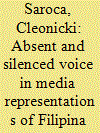

|
|
|
|
|
| Publication |
2013.
|
| Summary/Abstract |
This article explores the absent and silenced voice in Australian newspapers through case studies of two Filipino women - Nenita Westhof and Marylou Orton - who were victims of homicide in Australia. It draws on a feminist discourse analysis of newspaper articles and interviews conducted with their families and friends. The method used is one way of enabling people to hear the stories of those who do not have a voice in the present. Analysing newspaper representations in light of the interviews provides an entirely different, more accurate and just reconstruction of the women's lives. Media representations of Nenita and Marylou bore little resemblance to their 'lived reality'. In most instances, journalists did not acknowledge that the women were victims of domestic violence. Furthermore, sexist, racist and class-based discourses constructed Nenita and Marylou in accordance with dominant representations of Filipino women in Australia. They were held accountable for their own deaths, while their abusive male partners were frequently portrayed as victims of women who abused them. The article argues that such representations sensationalize the issues, misrepresent violence as the women's fault and shift responsibility from the perpetrator to the victim. In the process, they silence women's voices.
|
|
|
|
|
|
|
|
|
|
|
|
|
|
|
|
| 2 |
ID:
155544


|
|
|
|
|
| Summary/Abstract |
Chelsea Szendi Schieder, a political scientist at Tokyo’s Meiji University, describes how, in the wake of Japan’s triple disaster (earthquake, tsunami, and nuclear meltdown), the country has moved to fortify national harmony and women’s place in the traditional family unit. But Schieder writes that, for women struggling to extricate themselves from violent households, these “bonds that link families become bondage.” She discusses how policies under Shinzô Abe, including a proposed constitutional revision, seek to strengthen the neoliberal order at the expense of women.
|
|
|
|
|
|
|
|
|
|
|
|
|
|
|
|
| 3 |
ID:
092651
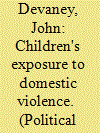

|
|
|
|
|
| Publication |
2009.
|
| Summary/Abstract |
The issue of domestic violence has gained greater recognition within public policy in the United Kingdom over the past decade. There is a recognition that up to one million children may have been exposed to violence between the adults with whom they live. This has consequences for the child in both the short and long term in terms of social and emotional adjustment. However, most male perpetrators of domestic violence are never held to account through the criminal justice system and therefore the child protection system is the safety net for these children. This though can result in a response that is premised on women's responsibility to protect their child from experiencing harm, typically by either leaving or forcing her partner to leave. Child welfare professionals do not engage with the men who are the source of the problem, rather women are held accountable for allowing their children and themselves to be in this situation. In this article this issue is discussed and proposals offered to improve this situation through empowering women, holding men to account for their behaviour whilst also recognising their position as fathers.
|
|
|
|
|
|
|
|
|
|
|
|
|
|
|
|
| 4 |
ID:
081058
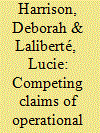

|
|
|
|
|
| Publication |
2008.
|
| Summary/Abstract |
This article explores the tension between military objectives and the "democracy value" cherished by Western civilian societies, using the situations of injured military members and the living conditions of civilian spouses; in particular, the responses of the Canadian Forces to members' posttraumatic stress disorder, and to spouses who are victims of domestic violence. The authors show how these responses currently privilege military objectives over the democracy value to an extent that is incompatible with the human rights of civilians or military members. They conclude by discussing how military leadership training could be modified to produce an altered balance between the two value systems
|
|
|
|
|
|
|
|
|
|
|
|
|
|
|
|
| 5 |
ID:
131565
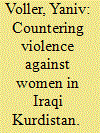

|
|
|
|
|
| Publication |
2014.
|
| Summary/Abstract |
The struggle against gender-based violence in the Iraqi Kurdistan Region has witnessed some significant achievements since the late 1990s. A subject long excluded from public discourse in the region, it has now moved increasingly into the mainstream, compelling the Kurdistan Regional Government (KRG) to take legal and practical measures against such practices as honor killings, female genital mutilation, and domestic violence. This article traces the sources of these shifts in the KRG's stance, looking especially at the role of transnational women's rights networks in the region. It highlights these networks' successful strategy of binding their cause to the KRG's endeavor to legitimize and consolidate its contested sovereignty over the Kurdistan Region. In doing so, the paper addresses an underexplored subject in the literature on women's rights campaigns in the Kurdistan Region and contributes to the study of transnational advocacy as a source of normative change.
|
|
|
|
|
|
|
|
|
|
|
|
|
|
|
|
| 6 |
ID:
163272


|
|
|
|
|
| Summary/Abstract |
Why do governments and militaries publicly condemn and prosecute particular forms of abuse? This article explores the Sri Lankan government's decision to promote limited legal accountability for state-perpetrated rape committed in a country otherwise renowned for widespread impunity. We argue that rather than representing a turn against impunity, the symbolic stance against conflict-related sexual violence in a small number of high-profile cases served an explicitly politico-military agenda. The state deployed legal accountability in specific cases to garner political legitimacy among key domestic audiences. The Sri Lankan government drew on the symbolism of female victimhood to mobilize support at a time when support for military counterinsurgency was waning. We show that governments can uniquely instrumentalize sexual violence cases to establish moral authority and territorial legitimacy. Through an examination of the domestic legal response to state-perpetrated human rights abuses, we illustrate the many ways in which women's bodies—and the law—can be mobilized in war to serve military ends.
|
|
|
|
|
|
|
|
|
|
|
|
|
|
|
|
| 7 |
ID:
111803
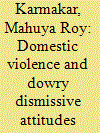

|
|
|
| 8 |
ID:
188976
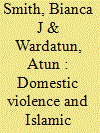

|
|
|
|
|
| Summary/Abstract |
This article argues that the Sufi practice of dhikr in combination with Quranic recitation and prayer can be understood as “hidden agency” Muslim women exercise in their mediation of violence and piety, particularly so in attempts at lessening their suffering of domestic violence. Our arguments indicate that women actively work towards employing a spiritual approach to their suffering that can be described as Sufi and that they exercise agency in an Islamic way that is bound by their connection with Allah. Our use of the term agency is therefore a nuanced one that is multidimensional and flexible in that it can expand and contract in different circumstances and is at the same time concerned with one’s embeddedness in Allah’s Divinity. This understanding of agency contrasts with normative sociological and feminist ones that see agency as a human’s capacity to act in response to social structures and power relations without necessarily allocating a dimension for an understanding rooted in Divinity. Based on anthropological fieldwork from 2017 to 2020 in Lombok, West Nusa Tenggara, Indonesia, we explore Muslim women in abusive marriages by engaging the notion of a pluralized agency that women exercise in an Islamic framework. The article further considers ethical tensions feminists face when working with women victims who do not live from a human rights understanding of domestic violence and instead focus on enhancing piety in response to suffering.
|
|
|
|
|
|
|
|
|
|
|
|
|
|
|
|
| 9 |
ID:
113859
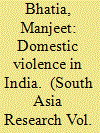

|
|
|
|
|
| Publication |
2012.
|
| Summary/Abstract |
After prolonged lobbying, the Protection of Women from Domestic Violence Act of 2005 was implemented in India in October 2006. The Act soon gave rise to cases. This article is based on a preliminary study using questionnaire-based interviews of litigants in Delhi who were involved in cases under the Act. Primary data, taken from all the Delhi Metropolitan Magistrates Courts at that time, concern the background of those who used the law, the litigation process, implementation of the law and the forms of violence addressed. The article seeks to assess the effectiveness of this new legislation and examines specifically what kinds of people bring actions under this new gender-specific law. In addition, qualitative assessment of the perceptions of different kinds of violence by complainants and respondents provides deeper insights into ongoing and potential contestations over gender-based violence.
|
|
|
|
|
|
|
|
|
|
|
|
|
|
|
|
| 10 |
ID:
164752
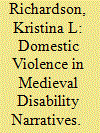

|
|
|
| 11 |
ID:
141437
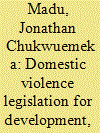

|
|
|
|
|
| Summary/Abstract |
Though laws have been enacted in different parts of Nigeria to address some aspects of gender-based violence, domestic violence persists with serious consequences for social and economic development. Nigeria has not enacted specific domestic law that is applicable throughout the federation, despite the United Nations mandate to all countries to adopt and enforce such laws by 2015. This article examines the causes and nature of domestic violence in Nigeria, and the legal reform needed to address the situation. In addition to library sources, the study used focus group discussions and individual interviews (involving the general population, key informants, legislators and traditional rulers) to discover that enacting specific national domestic violence legislation is necessary to address the problem in Nigeria, but enacting laws alone is not a magic bullet.
|
|
|
|
|
|
|
|
|
|
|
|
|
|
|
|
| 12 |
ID:
130732
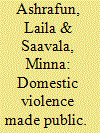

|
|
|
|
|
| Publication |
2014.
|
| Summary/Abstract |
Disputes within the family and cases of domestic violence in Bangladesh have traditionally been resolved either among kinsmen or in village panchayats where young women have had less opportunity to be heard. This article describes a third-sector initiative in alternative dispute resolution (ADR) in cases of domestic violence in Sylhet, Bangladesh. Data from 20 case studies of female victims of domestic violence, interviews with six lawyers, and participant observation in 10 mediations in a counselling centre are used to examine how this kind of social innovation affects the bargaining position of battered women in a kin-based, patrilineal and patrilocal society. The battered women involved in these mediations were rural or urban, less educated, and economically disadvantaged. The findings illustrate the limitations of ADR in cases of domestic violence. ADR as practiced in Sylhet, Bangladesh provides poor women a chance to be publicly heard in mediations of their domestic crises. However, ADR often fails to deliver lasting, just, and socially progressive solutions. The adoption of ADR practices should not be considered as an alternative to the development of the formal judicial system, because it lacks the power to enforce agreements and supports the hegemonic status quo, leaving the battered woman and her natal family with very limited options.
|
|
|
|
|
|
|
|
|
|
|
|
|
|
|
|
| 13 |
ID:
076320
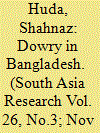

|
|
|
|
|
| Publication |
2006.
|
| Summary/Abstract |
Marriage negotiations for Bangladeshi Muslims involve various financial transactions including primarily the religiously sanctioned dower (mahr). Added to mahr, the practice of dowry or joutuk, demands made by the husband's side to the bride's side, have in the last few decades become a widespread practice supported neither by state law nor personal laws, but apparently designed to strengthen traditional patriarchal assumptions. Based on detailed fieldwork, this article discusses the historical assimilation of dowry practices in Bangladesh, including debates regarding its social ramifications on women's rights in Bangladesh, linked now to growing evidence of dowry-related violence. The existing dowry practices, despite legal intervention, continue to compromise women's rights in Bangladesh.
|
|
|
|
|
|
|
|
|
|
|
|
|
|
|
|
| 14 |
ID:
190822
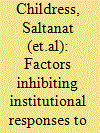

|
|
|
|
|
| Summary/Abstract |
The study identifies factors that limit effective institutional responses to domestic violence (DV) in Kyrgyzstan, in the context of recent legislative actions aimed at reducing DV through improvements in law enforcement, judicial processes and provision of social services. The study uses qualitative, grounded theory methods to analyse interviews and focus groups with 83 professionals working in these sectors. Two major themes emerge from the analysis: (1) barriers to effective institutional responses from internal challenges and constraints; and (2) social resources and challenges identified as important to provide a better collective response. The study highlights the need for capacity development within institutions and broader social learning to overcome existing barriers and better align outcomes with the intentions of recent legislation. Standardized training, awareness-raising, enhanced roles for educators and religious leaders, better coordinated social service provision, rehabilitation for victims and perpetrators, and family-centred school-based interventions are identified as targets for improving responsiveness.
|
|
|
|
|
|
|
|
|
|
|
|
|
|
|
|
| 15 |
ID:
157780


|
|
|
|
|
| Summary/Abstract |
Many studies have looked into domestic violence but very few have considered women’s knowledge and perception about their rights. This study aims to examine the main sociocultural factors behind domestic violence against women with an emphasis on the power of the knowledge and perception of the women about their international and constitutional rights. Quantitative data collected in 2015 in the regions of East and Southwest Burkina Faso is used in this paper. Multivariate logistic regression is implemented to take into consideration the net effects of each factor when controlling the effects of other covariates. Results of this paper can be used to implement actions against domestic violence in the zone of intervention of the Program of Sexual Health and Human Rights project.
|
|
|
|
|
|
|
|
|
|
|
|
|
|
|
|
| 16 |
ID:
138499
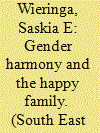

|
|
|
|
|
| Summary/Abstract |
A renewed global emphasis on ‘traditional culture’ threatens progress in women’s and sexual rights. This article focuses on Indonesia, where concepts such as ‘gender harmony’ and ‘the happy (Muslim) family’ have become state policy and where neo-Salafism is gaining ground. Indonesia’s first President, Sukarno, who managed to balance the army, Communism and Islam, was swept away during the period of mass murder in 1965–67 in which the Communist Party was destroyed. The struggle for women’s rights, as represented by the Communist-affiliated mass women’s organization Gerwani, became associated with sexual licentiousness through the slander campaign waged against the organization by the army. During the military dictatorship of Suharto, political Islam was allowed to grow. After the fall of Suharto, which introduced the so-called Reformasi period (from 1998), conservative Muslim forces gained control over important institutions. They strengthened a backward interpretation of women’s position in society. While a discourse of women’s rights prevailed after 1998, this has since been replaced by a heteronormative discourse on the ‘harmonious family’, in which women are assigned a subordinate position. The Ministry of Women’s Empowerment and Children’s Protection actively promotes this concept (at the global level too), asserting that it aims to reduce domestic violence. With the help of a discourse analysis of some key official documents, the passionate aesthetics underlying this emphasis on the reintroduction of patriarchal heteronormativity in Indonesia are exposed. Regrettably, the United Nations Population Fund supports the Indonesian Ministry on this path.
|
|
|
|
|
|
|
|
|
|
|
|
|
|
|
|
| 17 |
ID:
112829
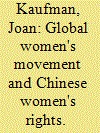

|
|
|
|
|
| Publication |
2012.
|
| Summary/Abstract |
The global women's movement is an example of a successful transnational civil society movement that is a mechanism for the globalization of ideas, aided more recently by the Internet. Two UN conferences, the International Conference on Population and Development in Cairo in 1994 and the Fourth World Conference on Women in 1995 in Beijing, advanced women's rights in China. The Beijing conference was a galvanizing event for the Chinese women's movement and a transformative experience for the All China Women's Federation (ACWF). The official UN meeting and NGO Forum provided opportunities for global interaction by the ACWF and NGOs working on women's rights. These connections transformed work on two issues affecting women's rights in China: the family planning program and domestic violence.
|
|
|
|
|
|
|
|
|
|
|
|
|
|
|
|
| 18 |
ID:
095710
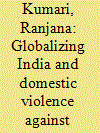

|
|
|
| 19 |
ID:
096047
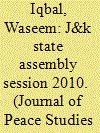

|
|
|
| 20 |
ID:
171114
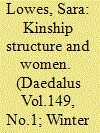

|
|
|
|
|
| Summary/Abstract |
Economists are increasingly interested in understanding how culture shapes outcomes for women and the origins of these cultural practices. I review recent work in economics on how culture affects the well-being of women in developing countries, much of which is motivated by work in anthropology. I present evidence on the role of kinship structure, particularly matrilineal relative to patrilineal systems, for shaping women's preferences, exposure to domestic violence, and the health and education of children. Additionally, I discuss research on the effects of cultural practices, such as bride-price, and how the organization of production affects gender norms. Economists, with a careful focus on causal identification, contribute to the evidence that culture is an important determinant of outcomes for women.
|
|
|
|
|
|
|
|
|
|
|
|
|
|
|
|
|
|
|
|
|